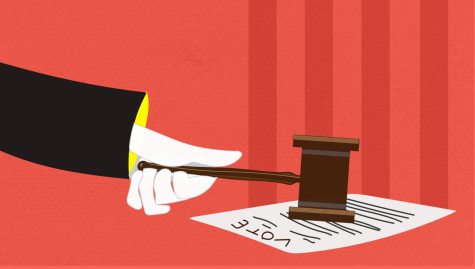Vote for those of us who can’t
February 26, 2020
Around this time last year, my parents, my sister and I received our green cards. After 14 years, we finally became permanent residents of the U.S.
My clearest memory of our U.S. Citizenship and Immigration Services interview is of my family sitting on uncomfortable chairs, tightly gripping our overstuffed Manila folders. Mine held my passport, social security papers and other mundane documents deemed crucial to my resident status. We guarded these folders so carefully because to the government, they contained our lives — without these papers, did we even exist?

We moved to the U.S. when I was not yet four. Before we boarded the plane, my parents had to teach me and my eight-year-old sister about the U.S. immigration system because the second our feet touched American soil, our bodies became sites of discourse. Though I could barely speak coherently, I knew several crucial facts about myself — I am an Indian citizen, I was born in Salford, England, and I am living in the U.S. on an H-4 dependent visa.
Dependent — it’s a word that scratches at my tongue.
Upon getting my green card, I was so excited to shed that label. But I had forgotten that non-citizen immigrants are uniquely dependent on the people of the country in which they reside. Until immigrants become citizens, they lack, among other things, the most fundamental right of any citizen of a democracy — the right to vote.
During elections my family and I sit at home praying that this will be the one where everyone turns out, watching minuscule percentage changes for hours. When I consider the idea of voting, the possibility of not exercising that right never occurs to me.
Throughout the presidential, congressional and local elections over the past four years, however, I’ve never failed to find people who can’t be bothered to vote. Can’t be bothered because the lines are too long, because they don’t like the candidates, because of any other inane excuse they could possibly conjure up. But the most common reason people give is that they’re simply not interested in politics and, consequently, couldn’t care less about voting.
What people don’t realize is that their lack of interest is a sign of extraordinary privilege.
Elections probably won’t affect them. This is not the reality for millions of disenfranchised communities across the country. We don’t get to not care.
When your body isn’t politicized, you have the privilege of never seeing your parents’ eyes flash with fear in an immigration office or spend thousands of dollars to live in colonized land. You never see firsthand the impact policies have on people’s lives.
Even though I couldn’t vote, I knew that I had to empower myself in whatever way possible because ignorance is not an option for me.
I educated myself as much as I could because my dad always said knowledge was power. I studied policies, elections and candidates, and I read the news diligently. I thought that at least now when I encountered someone who knew nothing about the American political world, I could impart whatever knowledge I’d gained.
I had no idea how deep political apathy seeped through American society. Instead of being able to motivate others to care about politics, I’m still powerless. Except now, I am educated and powerless, which is almost worse. I know all about legislation that marginalizes immigrants and other minorities, but I can’t do anything about it.
I’ve tried speaking to apathetic friends about the importance of being aware of what’s happening in the world around them, but I’m usually dismissed as dramatic. A while ago, a friend from high school told me that she just wants to live in her world of STEM because politics seem uninteresting. At the time, I didn’t want to say something I’d regret, so I dug my nails into my palms and kept quiet. But if the government won’t hear me, everyone else should.
For American citizens, voting is a right, a choice. To me, it’s a privilege. A distant dream.
Abstaining from voting is not an act of protest or individuality. It’s a selfish act that feeds into the oppression of millions of immigrants. As citizens of the U.S., Americans hold the world at their fingertips. Yet almost half the voting population lives oblivious — or indifferent — to its strength.
I am forced into powerlessness. The government does not hear my voice.
So this election season, choose to vote and stand up not just for yourself, but for me. For my family. For the countless others like us in the margins, forced into silence. You speak for us, so use your voice — your vote — wisely.






















Leave a Comment